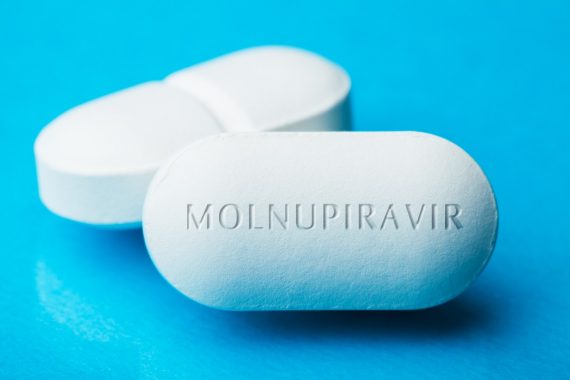GPs to refer ‘modest’ number of newly eligible Covid antivirals patients

GPs will be required to refer a ‘modest number’ of patients who could be eligible for antiviral treatments against Covid, NHS England has said.
In a letter sent to hospital and CCG medical directors last month, NHS England set out a list of those who will not be automatically alerted about their eligibility.
It said these patients – which include those who have been newly diagnosed with certain conditions since 15 November – should be alerted that they may be eligible if they test positive for Covid via PCR ‘as soon as possible’ and directed to their GP for a referral.
The letter said ‘most patients will be identified and contacted directly by a Covid Medicines Delivery Unit (CMDU) if they test positive and will not need to be contacted’ by their hospital or CCG.
However, it added that there are ‘a modest number of patients who will not be identified automatically, including patients who have received a new diagnosis since 15 November and defined subsets of the cohorts who cannot be identified from NHS Digital’s data’.
NHS England said that GPs and 111 are the ‘main referrer’ for these groups of patients, but that NHS trusts ‘may want to make a referral to a CMDU’ themselves for a patient under their care who has tested positive following a PCR test ‘in some cases’.
It said: ‘We are asking you to contact these groups of patients so they know what to do if they test positive for Covid via PCR.
‘They will need to proactively contact their GP or 111 for a referral to a CMDU.’
NHS England advice to trusts regarding patients who should be contacted about antivirals
- Down’s syndrome – No action required
- Sickle cell disease – Any newly diagnosed patients
- Patients with a solid cancer – All patients you think may be eligible under the policy
- Patients with a haematologic malignancy – All patients you think may be eligible under the policy. However, no action is required on individuals with the following conditions (unless they have been newly diagnosed):
o Chronic lymphocytic leukaemia (CLL)
o B-cell lymphoma
o Follicular lymphoma
o Waldenstrom’s macroglobulinaemia
o Multiple myeloma
o Acute lymphoblastic leukaemia (these are all included in cohort data) - Patients with renal disease – Any newly diagnosed patients or those who have had a recent renal transplant (since 15 November); All patients with CKD Stage 4
- Patients with liver disease – Any newly diagnosed patients who meet the policy criteria
- Patients with immunemediated inflammatory disorders (IMID) – Any patient newly started on immunosuppressant medication as detailed in Appendix 1 of the policy; Any patients who have had immunosuppressant drugs within the last 6 months from a hospital (no action required for those who receive those drugs via their GP)
- Primary immune deficiencies – Any newly diagnosed patients; Any patients with Autoimmune polyglandular syndromes/Autoimmune polyendocrinopathy, candidiasis, ectodermal dystrophy (APECED syndrome)
- HIV/AIDS – Any newly diagnosed patients; Any patient who has not listed their HIV status on GP records (if known)
- Solid organ transplant recipients – Any patients who have had a recent transplant (since 15 November)
- Rare neurological conditions (multiple sclerosis motor neurone disease, myasthenia gravis, Huntingdon’s disease) – Any newly diagnosed patients
Source: NHS England
Patients who believe themselves to be eligible for the treatment are also being asked to contact their GP or 111 for an ‘urgent’ referral if they are not contacted by the NHS within 24 hours of a positive PCR.
Meanwhile, NHS England also last month published a directory of CMDUs that are available for GP referrals.
It comes after GPs called for more details on how the new treatments would be deployed locally, amid scant information on when and where they would be able to refer patients.
The orders – which will be available to patients early this year – are on top of the 480,000 courses of molnupiravir and 250,000 courses of ritonavir announced in October.
As of last month, vulnerable patients in the community can access antivirals and monoclonal antibody treatments against Covid-19, with those eligible directed to local CMDUs.
GPs can also refer suitable patients for antiviral treatment via the University of Oxford’s PANORAMIC study.
Click to complete relevant Covid-19 CPD modules on Pulse Learning.
Visit Pulse Reference for details on 140 symptoms, including easily searchable symptoms and categories, offering you a free platform to check symptoms and receive potential diagnoses during consultations.
Related Articles
READERS' COMMENTS [4]
Please note, only GPs are permitted to add comments to articles










so the usual then…
NHSE have ‘sorted’ a problem by doing nothing effective and expect GPs to mop up after them.
At the same time they stoke everyones expectations through the roof, making that mopping up several times harder.
NHSE are expecting us to proactively screen huge numbers of covid positive patients for eligibility, then actively contact those who are eligible to see if CMDU have done their job – essentially we are being asked to safety-net a service they have set up, because they don’t trust their data or their systems. This is a huge amount of work to catch a tiny number of patients. I doubt practices have capacity, but if they do this should at least be funded as it is not core. Or NHSE could alternatively ask CMDUs to deliver the screening work (giving them remote read-only access to GP records) – but that would involve extra staff and expense, and they hope we will mop it up for nothing. Pulse, could you ask GPC to comment?
The drugs work and it’s a scandal that the majority of patients admitted to ITU were not offered treatment by the NHS shortly after diagnosis with Covid.
Then you’ll get guidance on why you shouldn’t have referred them.